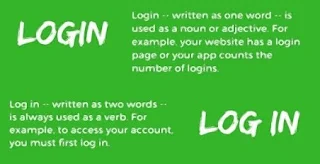As regards the difference
between Log in and Login, here is what Eric Nuamah
Korankye (Hamlet), the author of Before Breakfast Lessons (BBL), has got to
say:
Log in (written as two
words) is a phrasal verb. It means "to gain access to a computer system,
usually by providing...a username and password". Other synonyms
are "sign in", "log on", etc.
Login (written as one
word) is a noun. It is a user's identification (username, password) used to
enter a computer, programme, network, etc.
Examples
1. You should login to
your account first. (Wrong)
Correct form: You should log
in to your account first.
2. I have forgotten
my log in. (Wrong)
Correct form: I have forgotten
my login.
To further validate the
authenticity of Eric's submission on the subject matter, below is a usage note
from dictionary.com:
“Many who are neither
professionals in the computer field nor amateur tech enthusiasts condemn the
use of the solid form login as a verb, and with reason. It doesn’t
behave like a normal verb. You cannot say you have loginned, and you are
never in the process of loginning.
Moreover, you cannot even
ask someone to login you; you must ask that person
to log you in. Clearly, it is the two-word phrase log
in that functions fully as an English verb and not the solid form.
Normally, we would expect log in,the verb phrase and login, the
noun to behave in the same way as similar pairs: blow out/blowout, crack
down/crackdown, hang up/hangup, splash down/splashdown, turn
off/turnoff, where the two-word phrase is a verb and the one-word form a
noun.
And yet, this gluing
together of terms like login, logon, backup, and setup as
verbs is common, especially in writing about computers. Not for everyone,
however. Some well-known software companies, for example, carefully maintain
the distinction in their programs and documentation.
But habits are difficult
to change. Those who react to the one-word verb as an error will probably have
to get used to it, and those who use the one-word verb will have to recognize
that others will see it and wince.”

